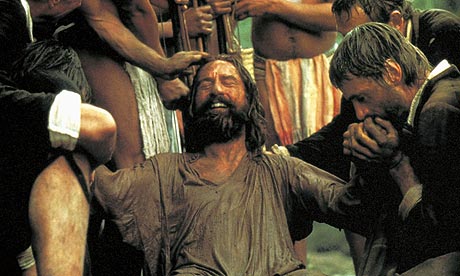 In The Mission, Robert De Niro plays the New World slave trader Rodrigo Mendoza. Mendoza returns from a trip slave-gathering (among the native Gaurani Indian tribe) to find that the woman he loves has fallen in love with his brother. In a fit of rage, and being a violent man, Medoza, his honor challenged, duels with and kills his brother.
In The Mission, Robert De Niro plays the New World slave trader Rodrigo Mendoza. Mendoza returns from a trip slave-gathering (among the native Gaurani Indian tribe) to find that the woman he loves has fallen in love with his brother. In a fit of rage, and being a violent man, Medoza, his honor challenged, duels with and kills his brother. He is immediately wracked with overwhelming guilt, and imprisons himself. It is there that he is visited by a priest, Father Gabriel (Jeremy Irons), who broaches the subject of forgiveness. Being Catholic (Jesuit, to be precise) expiation takes the form of penance, and Gabriel asks Mendoza to choose his penance. "There is no penance hard enough for me!" growls Mendoza. But, as those of you who've seen the movie know, Mendoza comes up with something.
In one of the more profound scenes every burned to celluloid, Mendoza carries all of his armor (his identity as a slave trader and mercenary) on his back up a mountainous waterfall toward the Guarani settlement. He is punishing himself for his sins. His statement that there is "no penance hard enough" for him is a common, though oft-suppressed, human sentiment. We feel that we are beyond the reach of grace. We are too far gone. With all our heart, we work for righteousness, all the while cultivating a certainty that we can never be good enough. Mendoza attempts to cleanse his soul through work. When one of the priests (an absurdly young Liam Neeson) considers his struggle too desperate and cuts the armor loose from his body, Mendoza climbs all the way back down the mountain to retrieve his Sisyphian burden, starting over again.
 When he finally gets to the summit, hours later and covered in mud, one of the Guarani runs up to him and holds a knife to his vulnerable throat. Mendoza has made a life of selling these Indians into slavery, and he is now without the strength necessary to protect himself. In an act of amazing forgiveness, the Indian, rather than cutting Mendoza's throat, cuts the armor from his body, freeing him.
When he finally gets to the summit, hours later and covered in mud, one of the Guarani runs up to him and holds a knife to his vulnerable throat. Mendoza has made a life of selling these Indians into slavery, and he is now without the strength necessary to protect himself. In an act of amazing forgiveness, the Indian, rather than cutting Mendoza's throat, cuts the armor from his body, freeing him. Now, there are obvious flaws in the theology of this sequence: he only accepts forgiveness after he feels he has "worked" hard enough to earn it. However, there are powerful themes at play here, even if the Devil is in the details. The Guarani has no reason to forgive Mendoza, but does. This inspires in Mendoza a life of righteousness, at least in movie terms. The forgiveness comes in a moment of blood, sweat, and tears, not in one of worthy supplication. In fact, Mendoza's tears after the armor is cut away from him betray his feeling that the forgiveness is still unmerited. Indeed, how has his "work," the penance for his brother's murder, benefited the Guarani? It hasn't. Yet Mendoza is forgiven anyway.


1EC715F98D
ReplyDeletekiralık hacker
hacker arıyorum
belek
kadriye
serik